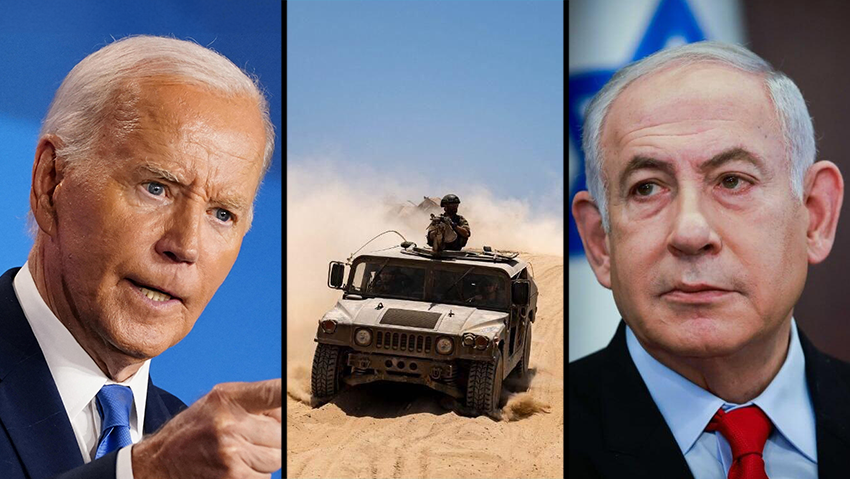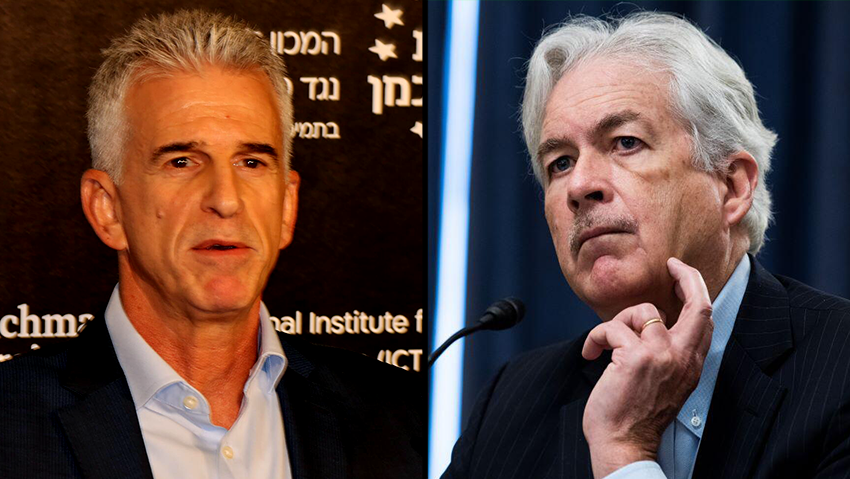Getting your Trinity Audio player ready...
The United States made it clear to Israel and mediators at the summit in Doha that an Israeli insistence on monitoring the return of civilians to the northern Gaza Strip in order to prevent the return of terrorists to the area would end chances for a deal. The U.S. also insists that no time limit be placed on a cease-fire.
Despite the expressed optimism after the talks in Doha last week, including from the prime minister's office, an Israeli source connected to the negotiations is concerned that Prime Minister Benjamin Netanyahu will use the demand he is said to have already agreed to compromise over to foil any chance for agreement.
2 View gallery


Joe Biden, IDF troops in Gaza, Benjamin Netanyahu
(Photo: Nathan Howard / Reuters, Flash 90 )
It has been widely reported that Israel's demand to control the movement of Gazans to the north was not part of the original outline presented by U.S. President Joe Biden in May and was added by Netanyahu in a document of clarifications late in July. After he agreed to lift it in exchange for Hamas dropping its demand for a declared end to the war, the prime minister reversed course and repeated the demand although he agreed to leave the final decision to the final stages of negotiations.
The official said Netanyahu could use his demand to receive further concessions from Hamas or to prevent a deal from being finalized
The PMO has disputed this, saying in a statement issued last week that: "The May 27 proposal stipulates that only unarmed civilians will be permitted to cross the Netzarim corridor to northern Gaza. The July 27 letter stipulates that an agreed-upon mechanism should be established to assure this (something that was initially raised by the U.S. mediator). The letter not only does not contradict the May 27 proposal, it facilitates it."
Security officials highlight Israel's main achievement thus far is the option of resuming the fighting after hostages are freed in the first phase of the deal and in the agreement preventing a regional war.
Negotiating teams are scheduled to meet in Cairo on Sunday to finalize agreements on humanitarian aid supplies and on the negotiation process after the first phase is completed. Teams that must agree on the measures to prevent the smuggling of weapons for Hamas through the Philadelphi corridor and Rafah border crossing to Egypt will meet later in the week.
Sources in Hamas told Saudi Arabia's Asharq Al-Awsat network that the American updated proposal includes a reduction of IDF forces along the Philadelphi corridor but not a full withdrawal and the return of the Palestinian Authority (PA) to the Strip to control the Rafah border crossing with Egypt.
The Americans also included Israel's demand to control the return of Gazans to the northern areas, so as to prevent Hamas terrorists from reestablishing their military capabilities there, although the mechanism was not yet been decided.
According to the Saudi report, Israel will be able to deport a large number of Palestinian prisoners that would be released from jails as part of the deal, the Hamas official said. Israel will also have veto power over the identity of at least 100 of the prisoners and will not be forced to withdraw entirely from the Strip. The provision of aid to Gaza is dependent on an agreement to these terms.
The source said negotiations for a permanent cease-fire will take place during the second phase of the deal and, if Hamas does not accept its terms, Israel would be able to resume the fighting. He also said the U.S. has suggested to leave negotiations over the rebuilding of Gaza and the end of the siege on the enclave until the first phase of the deal is completed.


